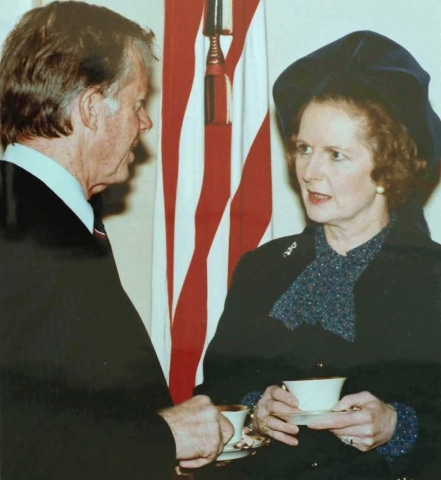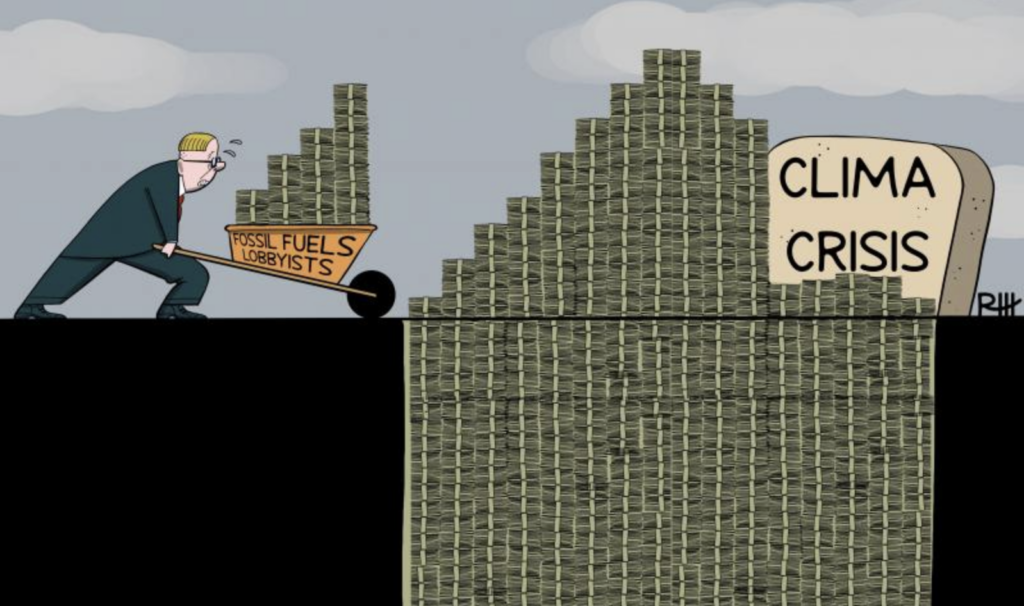This DeSmog UK epic history series post investigates the dramatic U-turn taken by the late Prime Minister Margaret Thatcher from environmental advocate to climate change sceptic.
The climate denier’s greatest success during the early 2000s was the apparent conversion of Margaret Thatcher, from the climate cause she so forcefully and eloquently championed as the British prime minister between 1975 and 1990, to a loyal sentry guard for the sceptic cause.
Thatcher published her autobiography Statecraft in 2002, shortly before she stepped out of the limelight due to her failing health. The autobiography included a long passage in which she renounced her former beliefs and even revised the meaning of her original 1990 address.
In her speech, Thatcher praised the creation of the Intergovernmental Panel on Climate Change (IPCC), called for precautionary action, and argued that economic growth must benefit “future as well as present generations everywhere.”
Economic Growth
But, as her autobiography reads: “By the end of my time as Prime Minister I was also becoming seriously concerned about the anti-capitalist arguments which the campaigners against global warming were deploying.”
“So in a speech to scientists in 1990 I observed: whatever international action we agree upon to deal with environmental problems, we must enable all our economies to grow and develop because without growth you cannot generate the wealth required to pay for the protection of the environment.”
The Iron Lady’s complete and dramatic U-turn meant that her free market admirers could reclaim her legacy and erase from history her arguments that economic growth must be environmentally sustainable while the public seemed to have mostly forgotten that one of the earliest champions of legally binding international agreements was, in fact, a staunch Conservative and economic Liberal.
Environmental Enemy
The cause of this volte-face was very evidently the belief that environmentalism was simply the old enemy of Socialism in a new guise, as presented by free market economists Friedrich von Hayek and Antony Fisher, and the think tanks they inspired.
“The doomsters’ favourite subject today is climate change,” she wrote. “Clearly no plan to alter climate could be considered on anything but a global scale, it provides a marvellous excuse for worldwide, supra-national socialism.”
She attacked former US vice president Al Gore directly and argued that “Kyoto was an anti-growth, anti-capitalist, anti-American project which no American leader alert to his country’s national interests could have supported.”
Free Market Inspiration
Thatcher, in her notes, expressed gratitude for the fact that “the issues have been clearly analysed and debated by scholars in the United States.”
She informed her readers that her revised position on climate change was based on reading Julian Morris’s Climate Change: Challenging the Conventional Wisdom published by her old friends at the Institute of Economic Affairs (IEA), Richard Lindzen’s Global Warming: The Origin and Nature of the Alleged Scientific Consensus from the Koch- and Exxon-funded free market Cato Institute and Fred Singer’s Climate Policy: From Rio to Kyoto: A Political Issue for 2000 and Beyond put out by the right wing Centre for the New Europe.
All three men were members of free market think tanks and were funding recipients from the fossil fuel industry. And so the former prime minister, in turning to scepticism, relied almost entirely on publications put out by free market lobby groups, rather than relying on the scientific literature.
Her new understanding of the science rested on a pamphlet from the Reason Foundation published in December 1997 and titled A Plain English Guide to Climate Science.
The guide claimed that: “It is widely acknowledged that the potential temperature changes predicted by global warming theory do not pose a direct threat to human life. Human beings, and a myriad of other organisms, exist quite comfortably in areas with temperature ranges more extreme than those predicted by global warming models.”
The Foundation received $70,000 the following year from ExxonMobil to “assess public policy alternatives on issues with direct bearing on the company’s business operations and interests.”
Successfully Neutralised
And so, the political consensus – that the science of climate change had alerted the world to the need for urgent and dramatic improvements to the clean production of energy – had been broken, and one of the earliest and keenest advocates had been successfully neutralised by the sceptics.
Thatcher’s legacy would simply be the rapid and controversial implementation of the free market in Britain, which would reverberate through the economies of the world and have serious ecological implications.
The next DeSmog UK epic history post details the 2003 heatwave in Europe and the pivotal moment it played for climate denier, Lord Lawson.
Photo: Maragaret Thatcher pictured with Jimmy Carter via Wikimedia Commons
Subscribe to our newsletter
Stay up to date with DeSmog news and alerts







